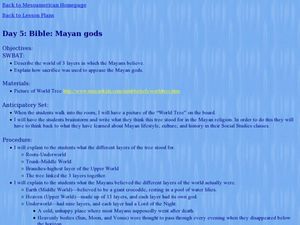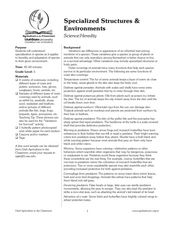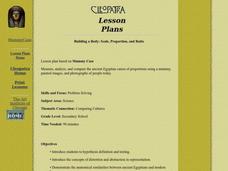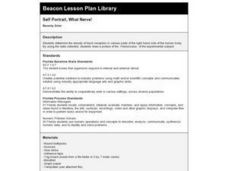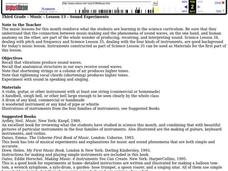Curated OER
Cells All Around
Students measure the size of an epithelial cell and to estimate the number of epithelial cells in a given area of the body. After watching a video on cells, student groups perform an experiment using a microscope to view some of their...
Curated OER
Squid Dissection
First graders participate in dissecting a squid. They identify and locate specific parts of a squid with teacher guidance. They draw a picture of what their squid looked like and label specific parts.
Curated OER
Ya' Gotta Have Heart
Fourth graders study the parts of the human circulatory system and how they function. They design a flow chart of the circulatory system and use data to construct charts and graphs.
Curated OER
The Relationship of the Five Values to the Human Personality
Learners are introduced to the five senses and how they are sorted throughout the brain. After reading about each type of mind, they discuss ways in which they can focus on each one on a daily basis. As a class, they discover ways in...
Curated OER
The Internal Anatomy of the Grasshopper
Sixth graders explore the internal organs of grasshoppers. They determine the function of the organs through a dissection activity.
Curated OER
Respiratory and Circulatory Research Project
Students use the Internet and books to research the respiratory and circulatory systems. They also write a report on different diseases and present to the class.
Curated OER
The Circulatory System
Students explore the circulatory system of animals. Using the Internet, students research animals without circulatory systems. They identify the three types of blood vessels and describe the flow of blood through the heart. Finally,...
Curated OER
Moving and Growing
Students explore the types of skeletons in various animals. In this skeletal systems instructional activity, students watch a video clip about skeletons, view a human skeleton, compare the skeletons of humans, chickens and fish, and...
Curated OER
Healthy Heart
Students explore how the heart works, examine pictures of a troubled heart, and discuss how to keep the heart healthy.
Curated OER
Measuring Calories in Food
Learners measure the amount of calories in food. In this food energy lesson, students discuss what a calorie is, how our bodies use a calorie, and how many we need. Then, learners use a calorimeter to calculate the amount of energy in a...
Curated OER
Animals In Winter
Young scholars read story Animals in Winter, and explore similarities and differences in how humans and other animals prepare for survival in winter. Students create class book that compares and illustrates different ways humans and...
Curated OER
Animal Adaptations
students in groups to work on bulletin board, making a list of animal adaptations. They write an example of each body covering and find pictures of animals with these coverings. They mount pictures and label the covering. They should be...
Curated OER
Honeybee
Young scholars investigate honeybees and the importance of honeybees to humans. They identify the various parts of a bee's body using velcro parts, role-play a hive, and answer review questions.
Curated OER
Bible: Mayan Gods
Young scholars discover beliefs and practices of the Mayans. In this Mayan gods lesson, students discuss "The World Tree" of the Mayans, the three layers of the tree, and their meanings. Young scholars discover the manner and...
Curated OER
Specialized Structures and Environment
Fifth graders read about how different animals protect themselves, and how characteristics give animals an advantage in their environment. Students then discuss a variety of "outer" wear for humans, and what they might choose to wear in...
Curated OER
Major Functions
Seventh graders investigate the basic characteristics and needs of living things. They identify the major parts of plants and animals by making lists. Students focus upon one living thing and speculate how if one part is changed how it...
Curated OER
Forms of Energy
Students, working in expert groups, study a form of energy. They plan a slide show presentation using pictures, clip art, and student taken digital pictures that show the energy type they have become experts in. They use a planning sheet...
Curated OER
Classroom Identity
Students explore fingerprints. In this finger prints activity, students investigate how to classify fingerprints. Students study large pictures of fingerprints and circle the patterns they know how to identify. Students then take their...
Curated OER
Building a Body: Scale, Proportion, and Ratio
Students measure, analyze, and compare the ancient Egyptian canon of proportions using a mummy, painted images, and photographs of people today.
Curated OER
Animal Coverings
Students categorize animals by their coverings. They list descriptive words, explore a science center with actual animal coverings, match pictures of animals with coverings, and categorize pictures of animals by their coverings on a...
Curated OER
What Does Your "Homunculus" Look Like?
Students determine the density of touch receptors in various parts of the body on the right hand side. They use collected data to draw a picture of the
"homunculus" of an experimental subject.
Curated OER
Self Portrait, What Nerve!
Students conduct an experiment to determine the distance between touch receptor fields in parts of the right-hand side of the body. They enter data into the data table.
Curated OER
Music
Third graders study sound waves and vibrations. They sing a silly round in three parts.
Curated OER
The Biological Carbon Cycle
Students learn about the biological carbon cycle. In this carbon cycle lesson, students access the web site and mouse over the diagrams to follow the carbon cycle. They read about what happens to humans and plants during this cycle.















